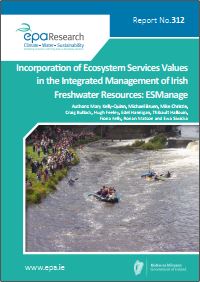Research 312: Incorporation of Ecosystem Services Values in the Integrated Management of Irish Freshwater Resources: ESManage
Authors: Mary Kelly-Quinn, Michael Bruen, Mike Christie, Craig Bullock, Hugh Feeley, Edel Hannigan, Thibault Hallouin, Fiona Kelly, Ronan Matson and Ewa Siwicka
Summary: The ESManage project tested an eight-step methodological framework to help embed ecosystem services and the ecosystem services approach into policy and decision-making for the sustainable management of water resources, as required by the Water Framework Directive (WFD).

Identifying Pressures
The ESManage project tested a methodological framework to help embed ecosystem services and the ecosystem services approach into policy and decision-making for sustainable management of water resources, as required by the Water Framework Directive. The eight-step framework involved identification of the relevant freshwater ecosystem services, prediction of how they change when management measures are implemented and valuation of that change. The focus of the research was on ecosystem services from rivers, engaging stakeholders in three case study catchments (Dodder, Suir and Moy) to explore the services derived from these very different rivers and undertake economic valuation of the benefits that people obtain from enhancements to ecosystem services in those rivers. In terms of impacts on ecosystem services, the key management scenarios investigated involved changes in diffuse pollution from agriculture, assuming unchanged inputs from domestic septic tanks and point sources, e.g. wastewater treatment plants, that also contribute to water quality problems in the study catchments.
Informing Policy
The project framework can be extended to incorporate a wider range of ecosystem services into decision-making relating to the management of freshwaters and protection of associated ecosystem services. In particular, workshops with scientists, stakeholder organisations and the general public highlighted the importance of cultural services to citizens, and therefore these should be a key component in ecosystem services assessments. The economic valuation provides data that can be incorporated into policy and management decisions. The project produced a series of recommendations for policy and practice.
Developing Solutions
The project demonstrated a structure for linking current Environmental Protection Agency catchment management tools, such as the Catchment Management Tool (CMT), Soil Moisture Accounting and Routing for Transport (SMART) model and Source Load Apportionment Model (SLAM), and hydrology and water quality datasets with ecosystem services using a Bayesian Belief Network model. This framework allows managers and policymakers to estimate the value of changes in such services produced by the management options at their disposal. The flexible framework also allows for additional catchments and management options to be added, and for future information on ecosystem responses to change to be incorporated.
https://www.epa.ie/media/archive/research/research-thumbnails/Thumbnail_312.jpg